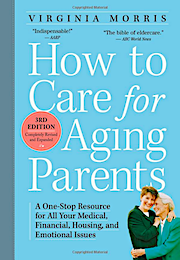Basically, there are two kinds of caregivers. The first group contains individuals who have chosen to make caregiving their professional occupation. (Doctors, nurses, therapists, and other official care providers.) The second group has had caregiving resonsibilities inadvertantly thrust upon them. (Parents, children, spouses, relatives and close friends.) The first group gets to benefit from many hours of academic training and guided experience. And they are not directly responsibility for the people they help. The members of the second group are basically on their own. And they ARE generally responsible, either legally, emotionally, or morally, for the individuals they assist. This website, more or less, addresses the needs of the second group.
You should count your blessings if your caregiving responsibilities are short-lived. Otherwise, caregiving duties can stretch on for weeks, months and years, and can evaporate every ounce of strength and spirit that you have. The draining effects of long-term caregiving may not seem apparent at first, but over time the emotional and physical damage can really add up. And you will come to find your own personal lifestyle aligning more and more with the person you are helping. If you are to keep yourself and your charge healthy, you will need to be pro-active when it comes to countering the negative effects caregiving can bring about.
The first thing you need to ponder is the type of situation you are facing. There are many different kinds, all needing a different approach. Is your patient suffering from a temporary setback, such as having had a broken bone, or having their gall bladder removed? Are they a young person who was born with a major defect or has suffered a crippling childhood illness? Have they contracted a potentially life-threatening disease that requires a monumental effort to cure? Or are you watching over an elderly person who is slowly fading away, perhaps from Alzheimers and dementia. The object of your care might even be an individual who is trying to live with Parkinson's Disease or Cystic Fibrosis. Is your charge bed-ridden, incontinent, paralysed, or incapable of making decisions? There are hundreds of variables out there to cope with. Which one is yours?
From here, there are a number of citical questions to be answered:
What level of care is required?
This is where you turn to the medical professionals for advice. They, above all others, will be able to give you the best idea about how your loved-one needs to be handled. They will tell you what kinds of treatments are necessary and what kinds of caregivers will be required to provide them. It could be that you (or another single caregiver) are all that is needed. Or the situation might require a team of specialists working at a medical center. Perhaps you will require a rotating cast of caregivers to come visit the patient's residence, or instead, the loved-one might need to be moved into a nursing facility. Your involvement will be determined by these factors.
What stage of condition is your loved-one at?
Just how bad off is your patient, and are they expected to get better or worse? Are they in the beginning stages of a disease, in the middle, or heading towards the end? Are medical techniques able to slow down the rate of the patient's decline? Does the patient have an injury that is fresh, or is it close to healing up? Was the patient initially in good health, or did they start out in a weakened condition? Does the patient have any contributing factors that will complicate a potential treatment? How long do doctors think it will be before the patient gets better, stabilzes, or fully declines? The answers to these questions will help to manage your expectations.
What are you capable of providing?
Once you get a reliable idea about the patient's condition, you will in a good position to make a assessment about your degree of future involvement. Have you envisioned a role for yourself in the patient's recovery, or long-term health situation? Do you feel that you will be able to provide all or part of the help that is needed? What sorts of services will you be capable of supplying, or not capable of supplying? Do you suspect that you yourself are going to need a few caregiving partners? Is caring for the patient something you can handle emotionally in the long run? Do you have ways to cope with the stress of a constantly changing, or unchanging, situation? How long will you be able to sustain yourself as a caregiver, as your own life situation changes?
Time and money considerations
Most caregiving situations have a cost, to both you and the patient. How much time and money do you have to put forward towards helping your loved-one? Are you holding down a job or taking care of your own household? Are you free of employment or retired? Can you add the burden of caring for another person to the activity of caring for the life you already have? Are the potential caregiving activities you would like to engage in going to spread you too thin? This can be one of the hardest decisions of all. Whether you are acting out of responsibility or out of love, sometimes that cost is more than you can take on. If that is the case, you need to seek out assistance.
Keeping your loved one and yourself in good mental condition.
Anyone who has ever been a serious caregiver will tell you that the job can be highly stressful, frustrating, and demanding. The emotional stress of supporting a semi-helpless person can really catch up to you and the physical demands can exhaust both your body and your mind. Eventually, (hopefully sooner than later), you will need to find someone to fill in and give you break. All caregivers need relief and an occasional vacation from the burden they carry. This applies to you. So find a way to take a break and make plans to go relax and recharge. If you don't, you will be in serious trouble. Both you and your loved-one don't want you to burn out and bring your participation to an untimely end. Do yourself a favor and locate some helpers. And find a support group with whom you can share your dreams and concerns.
- -
So what is it like to take care of someone with a health problem? Well, people who are in distress are always looking for relief. And both you and they are hoping that you will provide a little. Your job is to create hope and comfort. Sick and injured people can be quite pleasant at times, but they can also be needy, cranky, and demanding. They are, after all, frustrated by the inconvenience of not being able to be their complete selves. Patients can become withdrawn and get depressed, angry, even. There are times when they will ask the world from you, want your sympathy and affection, and lash out at you simply for being well. Part of your mission, therefore, is to be a mental therapist. You are going to have to not only roll with the punches, but also learn how to emotionally cope with your care recipient's moods and reactions. When you are done for the day, you may go home and cry, or congratulate yourself on a small victory or two. Remember, it is your role to give care, not theirs. Their role is to try and survive. And hopefully, you will too.
As tough as it is for sick and injured people to cope, it can be even more difficult for caregivers. You may find it incredibly trying to provide for a highly compromised individual. You may be called upon to dress them, bathe them, feed them, move them, entertain them, give them their drugs, and take them to the bathroom. If they have dementia, extreme movement issues, bad eyesight and hearing, or trouble communicating, these tasks can be even more difficult. And that's one person. Now imagine being a staff member in a nursing home that has to do that for 10 or 12 residents daily. It's a miracle that anything gets done at all. So make up your mind if this is something you want to take part in. We all know that in an ideal world, you'd love to do what you can and make a big difference in the life of someone special. But you have weigh the pros and cons and make certain that that can happen in the real world.
Here is a list some of the more common services you might find it necessary to provide:
- Provide emotional support
- Dispense medications at the proper times
- Awaken the patient and get them out of bed
- Pick out clothing and dress the patient
- Prepare meals and help feed the patient
- Bathe the patient and groom them
- Help the patient use the bathroom
- Move the patient from place to place, or reposition them
- Keep the patient company and entertain them
- Manage the patient's exercise program
- Transport the patient to doctor visits, stores, and places of interest
- Do around the home chores, such as minor cleaning, straightening, and laundry
- Intercept mail, phone calls, deliveries, and visitors
- Modify the interior environment as needed
- Take detailed notes
The Very, Very, Very Best of Luck to you and your loved one. And may God smile upon you both.
- -
Here are some helpful links to get you started:


